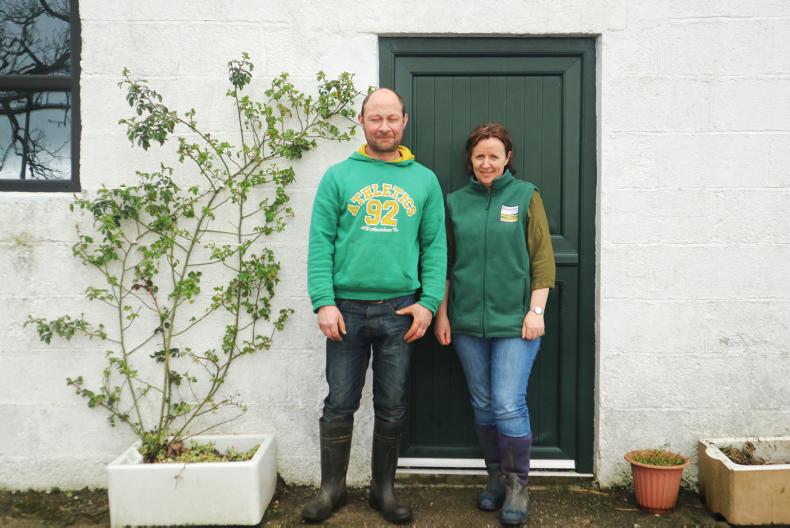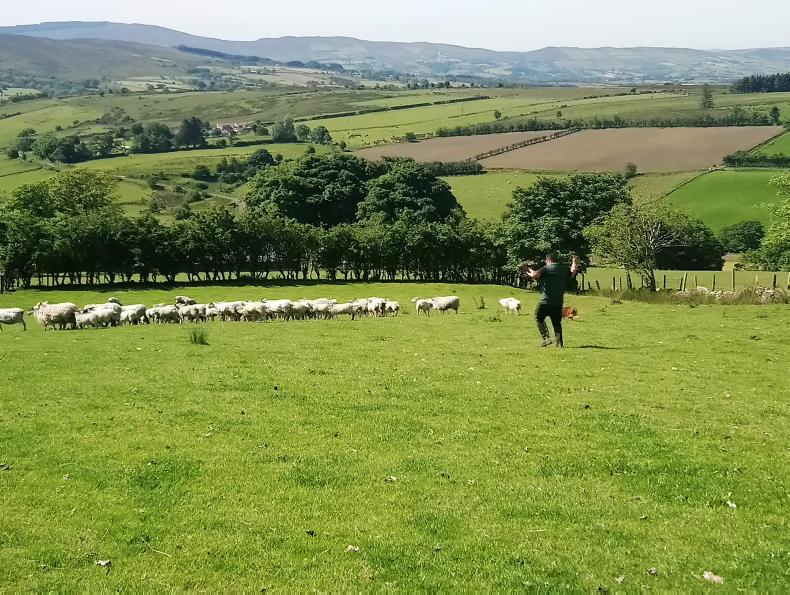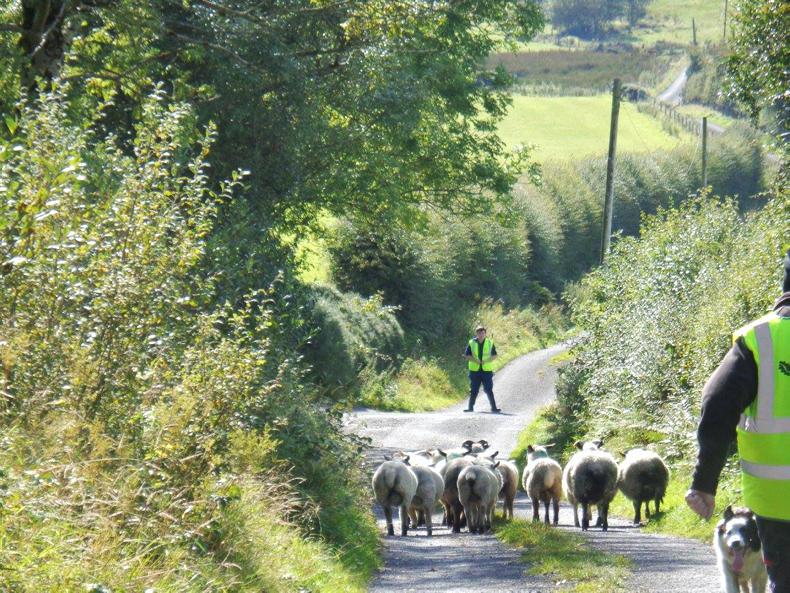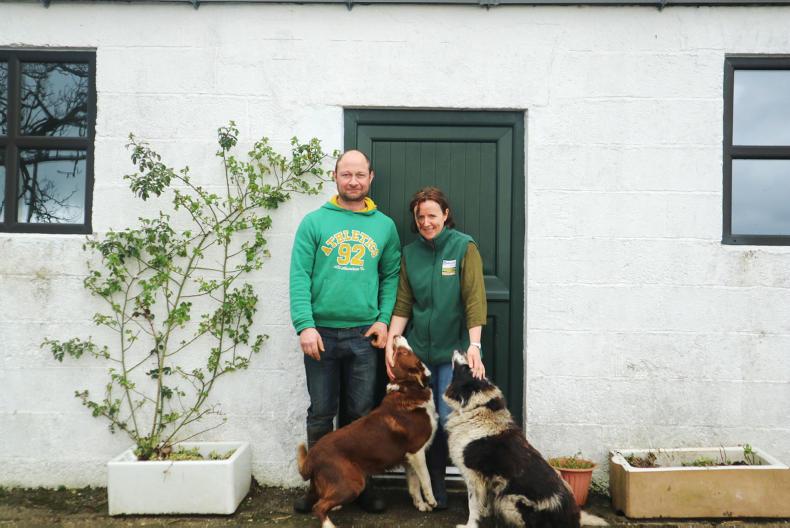Tucked away in north Tyrone, Butterlope Farm is home to social farmers Annie and Vincent Mullan. After tying the knot 13 years ago, the couple relocated from their home turf in Co Derry to the farm that belonged to Vincent’s late relative.
With three boys, 250 sheep and lambing in full swing, things can be hectic, but Annie loves life in the Sperrins – a tranquil setting which made her realise that the farm had much to offer.
Social farming enables those with learning disabilities and mental health challenges to engage in agriculture on an ordinary working farm to improve their health and wellbeing.
Annie embraced this initiative and for five years Butterlope Farm has been welcoming social farming participants, helping them to grow in confidence and find happiness in the simplicity of their family farm.
“I heard of social farming, of people working outdoors as a therapeutic activity through conferences and outdoor learning because environmental education was my background. I always knew that being up here and with the views, it had something to give and we wanted to share it.

Annie Mullan and her husband Vincent pictured at Butterlope Farm. \ Butterlope Farm.
“A social farming pilot was run by University College Dublin and Queen’s University seven years ago and we were involved with that. At the moment I’m working for Rural Support to help develop social farming standards. Farmers would undergo training with Social Farming Support Service, which helps to get farmers going and ensures that their farm is a safe place for people to come out to, and the standards will help with that.
“Many social farms tend to be small. We’re a very small farm and it’s not a mechanised farm. We have a tractor but we don’t use it when the social farming participants are here. We try to keep it almost traditional and safe for a family as well as participants.
Routine
“The participants would come two days a week. They arrive about half nine, we have a cup of tea and discuss what we’re doing that day. We would take care of the hens and do any garden jobs, and then it depends on what’s seasonal.
“They would work with the sheep, they dose, tag, gather them in and help with lambing. We don’t push them to do anything but we encourage them. Some would say, ‘I’m never going to dose a sheep’ and by the time they leave, dosing the sheep is their favourite job.
“We had a few men with Down’s Syndrome, they’re brilliant workers and can catch a lamb far better than I can. They come from all different backgrounds. For some it would be their first time on a farm and others would have grown up on a farm, and it’s like coming back to their childhood because their parents have passed on and now they’re being cared for in Omagh.

A social farming participant gathering the sheep at Butterlope Farm. \ Butterlope Farm.
“At lunch we gather around the kitchen table. Social situations can be hard so to see them come out of themselves and make friends is great. It’s lovely to hear them say, ‘This is what gets me up in the morning’ and when they say they’re happy, that means so much. Everyone has their problems and we see people who are recovering from ill mental health really benefit from social farming. They’re doing real work so they get real satisfaction from it, you can see their confidence grow and their physical abilities too. Social farming is good craic and it’s nice for Vinnie to see people other than me!
“Vinnie farms full-time, I do social farming with him and environmental consultancy work as well. The income (from social farming) has enabled me to work from home and there is great flexibility with the children.
“We also deliver LANTRA qualifications (health and safety and land based activities), so when people are here, they’re learning. I record that learning through photographs and gathering evidence.
“The hardest part is telling them that the programme is over, it’s a set programme at the moment and that’s part of social farming in Northern Ireland, trying to get it sustainable and funded.”
Transform your care
“Social farming is about social inclusion, it’s a day opportunity and a social care service. Transforming Your Care is a Health Trust policy. They’re trying to get away from congregated settings, it’s about getting them involved in the community.
“We have a 30-week and a 10-week programme. The 30-week programme starts in April and there are spaces available. You have to be over 16 and not in full-time education or employment, you can be part-time employed and still be eligible.

“The main thing is for people to be aware that we’re here. If there is someone in their family or they themselves have a disability, no matter how mild, if they can’t find anything that suits them, think of social farming as something to try. They can contact us and we can discuss it. We have fully funded places so you don’t need a referral through a social worker, they can come directly to us and see if it suits them.”
‘So Keep Farming’ is a social farming project led by RAPID in partnership with Gortilea and Butterlope Social Farms and part-funded through the Northern Ireland European Social Fund Programme 2014-2020, the Department for the Economy, the Health and Social Care Board, and the Department of Agriculture, Environment and Rural Affairs.
Find out more about Butterlope Farm see their website, visit their Facebook page or call 028 81647749 / 07840194792.
Read more
My Country Living: going for gold with Shirley McCay
My Country Living: more than just a racehorse
Tucked away in north Tyrone, Butterlope Farm is home to social farmers Annie and Vincent Mullan. After tying the knot 13 years ago, the couple relocated from their home turf in Co Derry to the farm that belonged to Vincent’s late relative.
With three boys, 250 sheep and lambing in full swing, things can be hectic, but Annie loves life in the Sperrins – a tranquil setting which made her realise that the farm had much to offer.
Social farming enables those with learning disabilities and mental health challenges to engage in agriculture on an ordinary working farm to improve their health and wellbeing.
Annie embraced this initiative and for five years Butterlope Farm has been welcoming social farming participants, helping them to grow in confidence and find happiness in the simplicity of their family farm.
“I heard of social farming, of people working outdoors as a therapeutic activity through conferences and outdoor learning because environmental education was my background. I always knew that being up here and with the views, it had something to give and we wanted to share it.

Annie Mullan and her husband Vincent pictured at Butterlope Farm. \ Butterlope Farm.
“A social farming pilot was run by University College Dublin and Queen’s University seven years ago and we were involved with that. At the moment I’m working for Rural Support to help develop social farming standards. Farmers would undergo training with Social Farming Support Service, which helps to get farmers going and ensures that their farm is a safe place for people to come out to, and the standards will help with that.
“Many social farms tend to be small. We’re a very small farm and it’s not a mechanised farm. We have a tractor but we don’t use it when the social farming participants are here. We try to keep it almost traditional and safe for a family as well as participants.
Routine
“The participants would come two days a week. They arrive about half nine, we have a cup of tea and discuss what we’re doing that day. We would take care of the hens and do any garden jobs, and then it depends on what’s seasonal.
“They would work with the sheep, they dose, tag, gather them in and help with lambing. We don’t push them to do anything but we encourage them. Some would say, ‘I’m never going to dose a sheep’ and by the time they leave, dosing the sheep is their favourite job.
“We had a few men with Down’s Syndrome, they’re brilliant workers and can catch a lamb far better than I can. They come from all different backgrounds. For some it would be their first time on a farm and others would have grown up on a farm, and it’s like coming back to their childhood because their parents have passed on and now they’re being cared for in Omagh.

A social farming participant gathering the sheep at Butterlope Farm. \ Butterlope Farm.
“At lunch we gather around the kitchen table. Social situations can be hard so to see them come out of themselves and make friends is great. It’s lovely to hear them say, ‘This is what gets me up in the morning’ and when they say they’re happy, that means so much. Everyone has their problems and we see people who are recovering from ill mental health really benefit from social farming. They’re doing real work so they get real satisfaction from it, you can see their confidence grow and their physical abilities too. Social farming is good craic and it’s nice for Vinnie to see people other than me!
“Vinnie farms full-time, I do social farming with him and environmental consultancy work as well. The income (from social farming) has enabled me to work from home and there is great flexibility with the children.
“We also deliver LANTRA qualifications (health and safety and land based activities), so when people are here, they’re learning. I record that learning through photographs and gathering evidence.
“The hardest part is telling them that the programme is over, it’s a set programme at the moment and that’s part of social farming in Northern Ireland, trying to get it sustainable and funded.”
Transform your care
“Social farming is about social inclusion, it’s a day opportunity and a social care service. Transforming Your Care is a Health Trust policy. They’re trying to get away from congregated settings, it’s about getting them involved in the community.
“We have a 30-week and a 10-week programme. The 30-week programme starts in April and there are spaces available. You have to be over 16 and not in full-time education or employment, you can be part-time employed and still be eligible.

“The main thing is for people to be aware that we’re here. If there is someone in their family or they themselves have a disability, no matter how mild, if they can’t find anything that suits them, think of social farming as something to try. They can contact us and we can discuss it. We have fully funded places so you don’t need a referral through a social worker, they can come directly to us and see if it suits them.”
‘So Keep Farming’ is a social farming project led by RAPID in partnership with Gortilea and Butterlope Social Farms and part-funded through the Northern Ireland European Social Fund Programme 2014-2020, the Department for the Economy, the Health and Social Care Board, and the Department of Agriculture, Environment and Rural Affairs.
Find out more about Butterlope Farm see their website, visit their Facebook page or call 028 81647749 / 07840194792.
Read more
My Country Living: going for gold with Shirley McCay
My Country Living: more than just a racehorse








SHARING OPTIONS